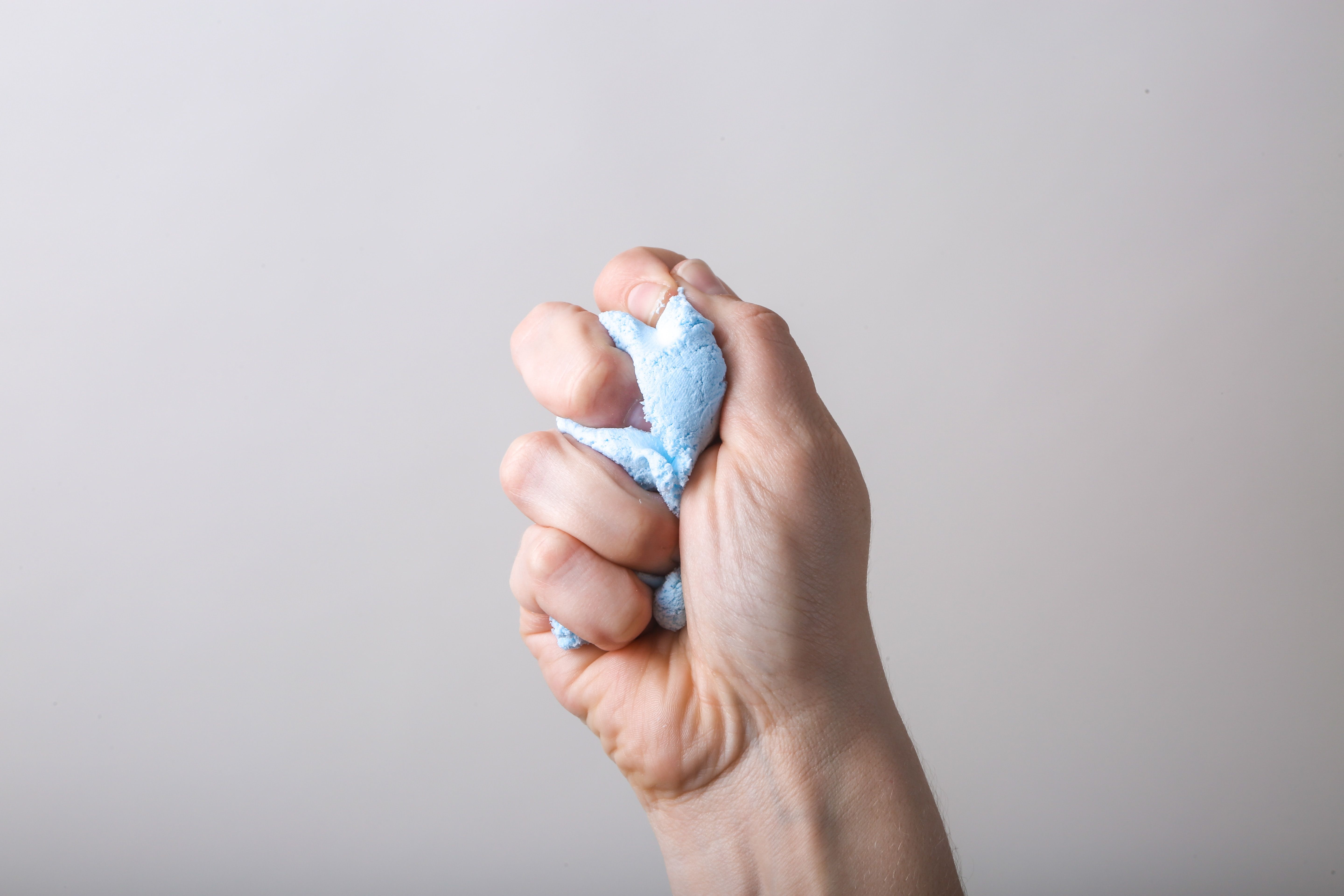
I Have OCD, And Intrusive Thoughts Aren’t ‘Quirky’ — They’re Torture
Here’s what OCD does: it takes the things we most value in this world and attacks them.
I have Obsessive-Compulsive Disorder and I don’t always wash my hands after I pee.
I have Obsessive-Compulsive Disorder and I’ve left the stove on more times than I'd like to admit.
I have Obsessive-Compulsive Disorder and it’s rare that you can see my bedroom floor; I basically use it instead of my closet or as a place to store empty chip bags and contact lenses I fling from my eyes before bed.
I have Obsessive-Compulsive Disorder and I don’t touch doorknobs three times or count under my breath before I take a step.
I do, however, imagine being crushed to death by the subway each time it plows into the station. Graphic images of penises flashed behind my eyes for an entire year. I’ve spent a fourteen hour bender scouring Reddit trying to decipher my sexuality.
If my body doesn’t feel just right before I get in the driver’s seat, I convince myself I’m going to crash my car. I avoid wearing certain clothing because it has a bad energy. I once called my ex-girlfriend fifty times in the middle of the night to find out if she thought she’d gotten a role in a play that would take her three hours away.
If I don’t text my parents back, I think they�’re going to die. I have dreamt for months on end of cheating on my partner and woke up ravaged with guilt. When I've exhausted my list of friends and family to ask for advice, I've found the phone numbers of complete strangers or emailed people I haven’t spoken to in years.
In every relationship I've ever been in, I am plagued with unending doubt and paranoia. Sometimes I stand paralyzed outside a friend’s door, my body unable to reach out and knock.
And for a long while I believed with certainty that my destiny was to leave my life and live inside a cave like The Buddha.
Here’s what OCD does: it takes the things we most value in this world and attacks them.
Want to be a parent? Brain tells you you’re a pedophile. Want to live a long and happy life? Brain tells you you’re dying imminently. Love your pet? Brain tells you you’re going to pick up a kitchen knife and kill it.
Want meaningful friendships? Brain creates false memories of things you did to sabotage your relationship. Love your partner? Brain makes you question whether or not they’re the one. Come out as gay? Brain tells you you’re secretly straight and lying to everyone.
And these are not fleeting thoughts. These are incessant, cruel, unending ruminations or visual images that torture you for hours on end.
These are not thoughts we can cast aside, they are obsessions. And these obsessions corkscrew the body, induce tremendous physical panic and pain, make us live in a state of perpetual fight or flight.
They are urgent, demanding, and so intolerable that our bodies try to do anything to make them stop. So we engage in compulsions – seeking constant reassurance and answers from those around us, the internet, the media.
We avoid children, give away our dogs, break up with our partners. We never get our driver’s license. We visit a different doctor every week. Switch out all our metal knives for plastic, or get rid of knives altogether. Create rituals to stave away the obsessions.
And we don’t tell anyone the extent of our panic; we keep it all inside, we fear jail time or disownment, so mottled with hot shame that we believe we are intrinsically bad, we are scum, we are unworthy of love.
This is the reality of the doubt disorder. This is the world of OCD we were never shown, because it lives inside our heads.
It was during a compulsive googling bender that I found a video on Relationship OCD. When I watched it, I sobbed, a brief moment of clarity coming over me in my distraught state.
Still heave-crying, I asked my talk therapist of eight years to watch the video. She was quiet after.
“I’m so sorry.” She said, “I didn’t catch this.”
We had been working together for eight years. I loved my therapist. She changed my life. I owe so much of my wisdom and healing and ability to care for myself to our therapeutic relationship.
I had a pattern, however, of keeping my obsessive ruminations from her. If I spoke them aloud — like going to live in a cave or the fear that my partner was not “the one” – they might become real.
Eventually my “secrets” would become too burdensome and my need for relief from them so dire that I would hysterically cry and recount each intrusive thought.
I know now this was a confessing compulsion, but at the time I believed I had to bare each ugly truth to my therapist, because that’s what I had been taught therapy was for.
But my talk therapist didn’t know anything about OCD, and so she would try to parse out my obsessions, find the root cause of them and apply meaning to them.
This fed my reassurance compulsion, giving me temporary relief in the hour or so after our session, but then the doubt would come barreling back – ten times worse than before — and I would be inconsolable.
When I found that video about ROCD, I knew I needed to get a different kind of help.
I was devastated to leave my therapist. I had spent many sessions over the years battering her with questions about the potential end of our relationship, overcome with such emotion that it felt like the end was always imminent. (I now know pre-grief and emotional preparation for an event that hasn’t and may never happen is another one of my compulsions.)
My emotional preparation for our ending was nothing like what I had prepped for – though my OCD brain was terrorizing me, a glimpse of hope and recovery helped my wise mind kick in. I needed a different kind of help.
The ERP therapy modality provides tools to help people tolerate tremendous discomfort.
It is the Gold Standard treatment for OCD and is most effective when paired with medication prescribed by a psychiatrist with a true understanding of how OCD impacts the brain. This combination is what gave me my life back.
In ERP therapy, you expose yourself to your deepest fears, starting with the most tolerable to least tolerable. You slowly work up to the things that cause you the most discomfort.
I’ve looked at photos of penises with my therapist, practiced being a “bad driver” (turned the radio on while driving), watched videos of people announcing they weren’t really gay, I have an app that randomly sends me messages of my intrusive thoughts throughout the day, and so many more.
A lot of my exposures entail me narrating the story of my worst fear happening in excruciating detail — having my therapist transcribe and read it back to me, and sending me a recording of the narrative for me to listen to throughout the week.
The ultimate goal of intentional exposures is to be able to tolerate your discomfort without acting on a compulsion.
For example, someone with contamination OCD might touch the sidewalk and resist washing their hands. This teaches the OCD brain we are more resilient than we think, and we do not need to give such power to our thoughts.
ERP not only supported me in navigating OCD — my entire worldview has shifted from applying ERP to my life.
I can tolerate discomfort in a way I never thought possible. I am so much less judgemental – you could spill every weird or fucked up thought or fear to me and I wouldn’t blink an eye.
This is in large part because I’ve been in an OCD support group for three years and met some of the most incredible humans, who have some supremely … creative … obsessions.
To be with folks who just get it is such a salve for my broken brain. It is a space free of judgment, reassurance, and there’s no labor to be done educating anyone on why my brain works the way it does.
I still rope my partner into reassurance benders. Sometimes I lose hours to rumination, and intrusive thoughts can still destabilize me.
But nothing is scarier than having undiagnosed OCD, and I am unendingly grateful that I found the care I needed.
So many people are living undiagnosed, though, tortured by the thoughts and behaviors that consume them every hour. All because our society is so misinformed about Obsessive-Compulsive Disorder.
OCD is a tricky bitch. She doubts everything, including her diagnosis. People reading this who have undiagnosed OCD will tell themselves they’re the exception — their thoughts are real.
To that, I'll say the number one mantra in ERP therapy: maybe.
But if you are tormented by unwanted thoughts, if you are pummeled by guilt and shame and unable to find relief or comfort, if you find yourself engaging in relief-seeking rituals or seeking constant counsel, I implore you to set up a free consultation with an OCD therapist.
In group, we allow ourselves the occasional “reassurance treat.” Here’s yours:
You are not your thoughts, and you are not the exception to feeling better.
Take action:
Find a therapist who specializes in OCD
Alma’s directory has over 20,000 providers, including those who specialize in OCD. Schedule a free consultation (or several!) with therapists and/or prescribers who can support you in your journey.
Jun 3, 2024

Looking for a therapist?
Get tips on finding a therapist who gets you.
By submitting this form, you are agreeing to Alma's privacy policy.



